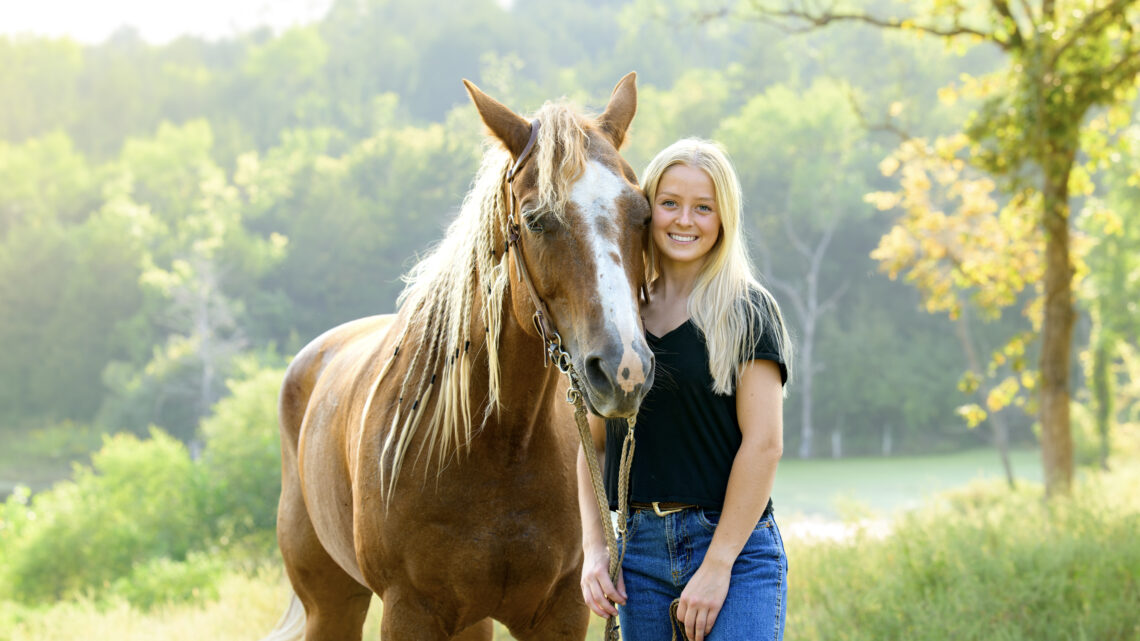He’s dwarfed by the horse, this small boy, that we’ll call Sam. Sam is six years old andhis muscle control and cognitive function are impaired, and time at the stables is his therapy. Instead of a sterile hospital environment, Sam is outside, soaking in the sun, learning to ride a horse. Each session is packed with activities crafted not just to improve Sam’s muscle tone, fine motor skills and cognitive capacity, but also to be fun.
“Hippotherapy is using the horse as a tool to aid in a therapy session,” explains Avery Tonniges, who graduated in May from Union’s Occupational Therapy Assistant program. “You can do anything on a horse that you can do in a normal session on the ground in a clinic.”
Now let’s imagine that on this day Sam is struggling and his mental space makes spending time on a horse unsafe. Thankfully, there’s a lot to learn about horses and their care; so, today Sam learns some basic horse husbandry. First he grooms the horse, the gentle strokes of the currycomb soothing both horse and boy, then he cleans and polishes the tack. Each activity builds his muscles, fine motor skills and his confidence.
Tonniges helped a boy much like Sam in her fieldwork rotation at Heartland Equine Therapeutic Riding Academy last spring.
“Spending time with him was the highlight of my time at HETRA,” Tonniges shared. “We made a connection. I was always excited for our sessions together—excited to help him progress on his therapy journey as he helped me on mine.”
This was Tonniges’ second fieldwork rotation.
Every student who enters the Occupational Therapy Assistant program at Union College participates in two fieldwork rotations and Fara Adams, academic fieldwork coordinator for the OTA program, works to ensure those two assignments provide a wide range of experiences.
“Fara has an individual meeting with each student when they enter the program,” explains Emily Rumery, program director for the OTA program. “That’s when she hears about their interests and starts working to find the fieldwork assignments that fit their needs. She spends a lot of time considering the best fit for each student.”
And she succeeded spectacularly with Tonniges’ fieldwork rotation at HETRA.
“I grew up riding horses and showing them in 4H,” explained Tonniges, “It’s my greatest passion. I didn’t realize it was possible to mix healthcare and my passion for horses.”
This union of passions is what Adams strives for with each student who walks through her doors. The OTA degree provides a wide range of job paths. If a student begins in pediatrics and later decides to change direction, this degree qualifies her to pivot and work in other settings. Adams understands that to fully prepare for this array of possibilities, students like Tonniges also need experience at a more traditional workplace.
“We try to give the student a well-rounded experience,” Rumery explained. “These two field rotations help prepare them for the variety of work they may encounter.”
With this in mind, Tonniges’ other fieldwork rotation was on Bryan Health West hospital’s acute rehab floor, which provides therapy to patients who need a higher level of care, patients whose main focus is completing activities of daily living — dressing, bathing, grooming hygiene and toilet tasks. While at Bryan, Tonniges also spent time leading their mental health group.
Adam’s passion for finding the right experience in the right place for the right student is played out at the beginning of every school year.
“Fara begins the search for a student’s perfect fieldwork experience the day they start the program,” stated Rumery. “She doesn’t just draw names from a hat, she pours over the list and prays over the list. She considers all the variables.”
Adams and the staff of the Occupational Therapy Assistant program understand that students are individuals with individual needs and desires. Their commitment to student success is another reason Tonniges thrived at Union.
“I loved the small class size,” she shared. “I got to meet all my classmates and became close friends with them. We had the same goals in mind, the same pathways, so we were on the same page when it came to studying. Having the same mindset was helpful not just in studying, but also in building relationships.”
The results are undeniable. Upon graduation, job offers rolled in. Not only did Tonniges’ supervisors at her two fieldwork sites speak with her about positions, but she was also offered three positions in the small Iowa town she moved to after graduation.
Tonniges’ fieldwork experience may be unique, but each student accepted into the OTA program finds a group of passionate teachers and administrators dedicated to their learning journey and a cohort of students who become companions, cheerleaders and friends to walk with through the journey.
“We’re really invested in our students,” Rumery shared, “and not just academically. We invest a lot of time and individual attention in each student who enters our program.”










